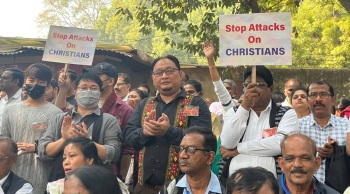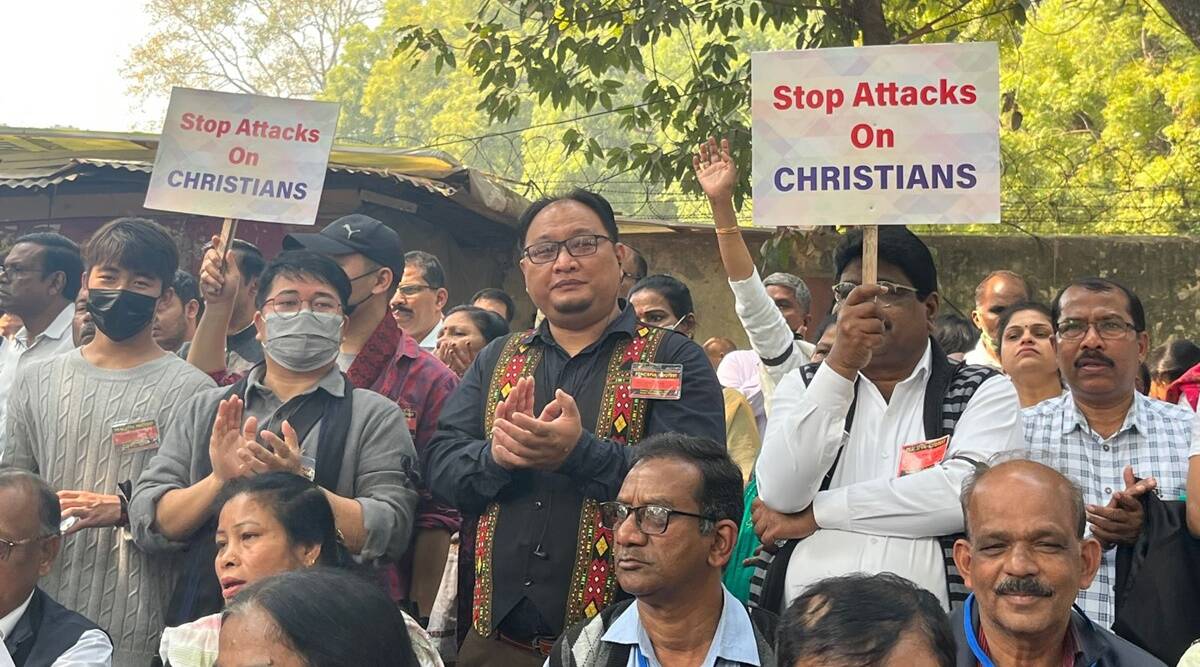
 A. J. Philip
A. J. Philip

I am grateful to my friend A.C. Michael for alerting me about a letter the Department of Legal Affairs of the Ministry of Law and Justice circulated among the judges of the Supreme Court hearing a case about forced conversion.
The letter was signed by Arvind Kumar Sharma and it was meant for the three-member Bench headed by the Chief Justice of India and consisting of Mr Justice P.S. Narasimha and Mr Justice J.B. Pardiwala.
The letter sought four weeks’ time to collect details from the state governments. It was the third such letter seeking an adjournment of the case. The government has been consistently saying that there is forced conversion to Christianity. It is the responsibility of the government to substantiate its claim by providing details of the forced conversion.
Why is the government forced to seek adjournment after adjournment, if it has the details of forced conversions? The answer is simple and straightforward. The government has no such statistics. It is not that the government is incapable of cooking up evidence. It needs time and that is why letters like the one mentioned above (W.P. CRL. No. 137/2022) is circulated among the judges.
There are several states like Madhya Pradesh, Odisha, Haryana, Uttarakhand, Gujarat, Uttar Pradesh, Karnataka and Himachal Pradesh where stringent anti-conversion laws exist. Some of them have been existing on the statute for more than 50 years. Let me repeat once again, for more than 50 years!
The laws were enacted to prevent forced conversion. They are quite stringent. If a person is converted through force, the man responsible for it will rot in jail for many years. Yet, why is it that not a single Christian priest or pastor or missionary has been convicted so far?
Yes, there have been thousands of false cases lodged against Christians as the cases are all built on false evidences. They collapse like a house of cards in a court of law. Anybody who has an idea of how Christians worship would be shocked by accusations that money is used to convert persons.
The fact is that the Christians are one of the poorest sections of society, except in a state like Kerala, where there may be an evidence of affluence thanks mainly to the younger generation migrating to countries like the US, Canada, Australia and Britain.
In fact, an overwhelming majority of the pastors, priests and others who work in His vineyard, to use a Biblical ex
The neo-converts, who are relatively poorer, are the ones who religiously give tithe. When I grew up in Kerala, my mother would ask me to take a handful of rice, pack it in a paper and take it to the church. The church that I belong to was built with “pidiari” (fistful of rice) that the faithful brought.
Today my church uses PayTM and GooglePay to collect money from its members. A few years ago, I attended a church in Odisha where I saw the members bringing rice in the same fashion I described. It is they who support their pastor or priest. It is not that the government does not know what I have described above.
If they admit it, they will have no case against the Christians. That is why false propaganda is made that Christians have been forcibly converting Hindus. In Kerala where Christians form less than 20 percent of the population, the figures of conversion show that more people convert to Hinduism than to Christianity or Islam.
The propagandists of Hindutva often make allegations of forced conversion to justify their attacks on Christians worshipping in villages. India is a secular nation but in most cases the police turn the other way when the attack takes place. Often, the police do not take cognisance of the complaints made by the Christians. Instead, they are jailed.
Fortunately, the judicial system is, by and large, dependable and the judges are able to make out when a person is produced before the court with the claim that he was forcibly converted. The fact of the matter is that forced conversion is not at all possible.
Conversion is a decision taken by the person concerned. When a person hears a powerful sermon, he may be influenced for a few minutes but once he comes out of the meeting hall or church, he goes back to his old ways.
I have seen in the villages of Uttarakhand the financial status of Christians improving within no time. It is not because they get money from the pastor. It is because they give up drinking, which will increase their income by as much as 50 to 100 percent.
They are also able to spend quality time with their family. The lady of the house will have a better sari and the children better dresses. The drunkard will feel jealous and will say that their prosperity is because of foreign money.
The Constitution grants the freedom to believe in any religion and also to propagate it. It is this right that the Christians exercise. Forget propagation, they cannot even pray together in many villages as underscored by the 600 or so cases registered against Christians in the last one year.
It is ridiculous to hear claims that laws have to be strengthened against the Christians who constitute less than 3 percent of the population. How can they be a threat to 80 percent of the Hindu population when all the levers of power, including the Army and the Police, the executive and the legislature are under the control of the Hindutvavadis?
Incidentally, Christianity has been in existence in India since the first century when St. Thomas is believed to have come to India and was martyred. I can say without fear of contradiction that as a community, Christians are the most law-abiding.
There have been many incidents of violence against Christians, be it in Kandhamal in Odisha, or in Uttar Pradesh and Chhattisgarh. Why is it that there is not a single instance of the Christians counter-attacking the aggressors?
Yes, the Christians occupy the moral high ground. When the mutineers of 1857 started their journey from Meerut to Delhi to capture power from the British, they attacked many churches on the way and killed the people who took shelter there.
There was never any retaliation from the church or its members because they believe in the sinless nature of Jesus, whom they want to imitate, successfully or not. But that has not slackened the campaign against the Christians.
The whole world saw how peacefully thousands of them congregated at Jantar Mantar last month to protest against the atrocities their fellow members have been experiencing.
As I mentioned in my column, the protest gathering resembled a Christian worship with choirs singing hymns and pastors saying Glory to God in languages as varied as Syriac and Khasi and Garo, not to mention Hindi and Haryanvi.
I found the police doing precious little as the crowd was well-disciplined and they did not have to intervene. This is the strength of the Christian community which they do not have to forego under any circumstances. It is said that among the jailbirds in the US, the Jews are the fewest in number. In India, this credit should go to the Christian community.
For those who believe in violence, they want retaliation from the Christian community so that they can paint them in their own hues. That is why they have been trying to provoke the members of the community without any success so far.
Even as the torture of the Christians continue in much of North India, the BJP has been doing everything possible to build bridges with the Christians in Kerala. The party believes that it can build a vote bank among the Christians in the State.
Today the BJP does not have a single MLA in Kerala. The party believes that it can win 10 percent of the seats if they reach an understanding with the Christians. That is why the party has hit upon the idea of letting the BJP members visit the Christian homes and remove their worries about the party.
People live in the third decade of the 21st century. They have all the information available on their fingertips. When a group of Hindutvavadis barge into a church and destroy the statues and other objects of art and worship, the news reaches everyone in the country. If it believes that the media can be controlled, they are mistaken for the news has its own way of reaching the public.
When Mahatma Gandhi was assassinated, the government took some time to make the announcement. In the meantime, the news spread by word of mouth from Kashmir to Kanyakumari and Kolkata to Ahmedabad in less than six minutes.
Actually, there is no need for the BJP to do a special campaign to win the confidence of the Christians. As it is, Christians do not want any special rights, except those guaranteed to them by the Constitution. Every Sunday, most churches make special prayers for the President and her Council of ministers.
When I met Dr Shankar Dayal Sharma who was the President of India at that time, he was pleasantly surprised when I read out to him the liturgy of our church in which there was a special prayer for him. I also told him that when the same liturgy is used in the US, the prayer will be for the President of the USA. We pray for the Queen in England and for the Emir in Dubai.
The BJP’s campaign to induct Christians in the party is misplaced. There is no bar on any Christian joining any political party. They can even join the Indian Union Muslim League.
What is more important for them is how the party treats the Christians in the areas where they are strong. The Christians of Nagaland or Meghalaya do not find anything amiss in voting for the BJP. Nor do they have any problems in Goa.
Christians also believe that the country is not safe for them if any minority community feels insecure. Let there be no doubt that Christians can never be secure when Muslims, Dalits and women are insecure. Unfortunately, there is a section of Christians who are so influenced by their Muslim phobia that they are willing to fall in the trap of Hindutva.
When Narendra Modi returned to power in 2019, the first thing he did was to criminalise triple talaq. There were many socio-economic problems facing the Muslim community but he did nothing to ameliorate their condition.
For instance, the government has watered the scholarship scheme for minority students. They have been deprived of scholarships while the government introduced reservation for the Upper Castes. There is no constitutional sanction for such reservation.
There are Christians, especially among priests, who believe that Muslims are engaged in a Love Jihad. It is as nonsensical as the claim that Triple Talaq was what bothered the Muslim community. They are the ones who would like to have a tie-up with the BJP in the next elections.
This is not surprising at all as history bears proof that a section of the organised church had little compunction in sharing the table with the Nazis during the Third Reich. Let the BJP give up its Hindutva agenda and treat all citizens as equals, irrespective of their caste or community affiliation, then the party will have many takers among the Christians.
It is when the BJP leaders do not condemn atrocities on Christians that doubt forms in the mind of the people about the party’s bona fides. The BJP needs to look inwards before it extends the Christians an invitation to join the party. Why should they join the party in Kerala when their brethren in the North are badgered day in and day out?